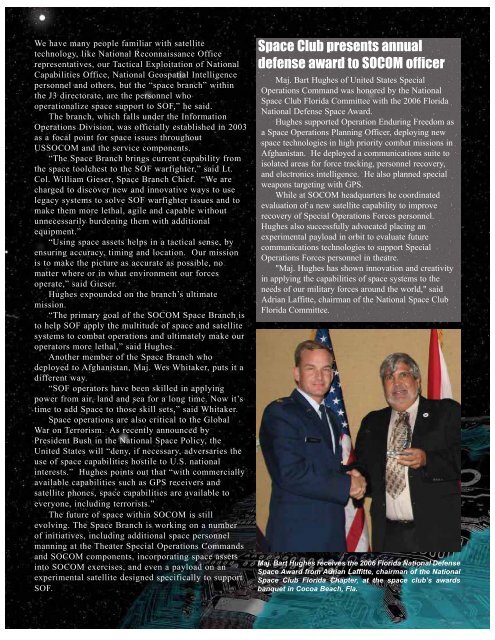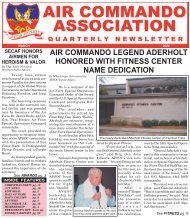tip of the spear (pdf) - The Air Commando Association
tip of the spear (pdf) - The Air Commando Association
tip of the spear (pdf) - The Air Commando Association
Create successful ePaper yourself
Turn your PDF publications into a flip-book with our unique Google optimized e-Paper software.
We have many people familiar with satellite<br />
technology, like National Reconnaissance Office<br />
representatives, our Tactical Exploitation <strong>of</strong> National<br />
Capabilities Office, National Geospatial Intelligence<br />
personnel and o<strong>the</strong>rs, but <strong>the</strong> “space branch” within<br />
<strong>the</strong> J3 directorate, are <strong>the</strong> personnel who<br />
operationalize space support to SOF,” he said.<br />
<strong>The</strong> branch, which falls under <strong>the</strong> Information<br />
Operations Division, was <strong>of</strong>ficially established in 2003<br />
as a focal point for space issues throughout<br />
USSOCOM and <strong>the</strong> service components.<br />
“<strong>The</strong> Space Branch brings current capability from<br />
<strong>the</strong> space toolchest to <strong>the</strong> SOF warfighter,” said Lt.<br />
Col. William Gieser, Space Branch Chief. “We are<br />
charged to discover new and innovative ways to use<br />
legacy systems to solve SOF warfighter issues and to<br />
make <strong>the</strong>m more lethal, agile and capable without<br />
unnecessarily burdening <strong>the</strong>m with additional<br />
equipment.”<br />
“Using space assets helps in a tactical sense, by<br />
ensuring accuracy, timing and location. Our mission<br />
is to make <strong>the</strong> picture as accurate as possible, no<br />
matter where or in what environment our forces<br />
operate,” said Gieser.<br />
Hughes expounded on <strong>the</strong> branch’s ultimate<br />
mission.<br />
“<strong>The</strong> primary goal <strong>of</strong> <strong>the</strong> SOCOM Space Branch is<br />
to help SOF apply <strong>the</strong> multitude <strong>of</strong> space and satellite<br />
systems to combat operations and ultimately make our<br />
operators more lethal,” said Hughes.<br />
Ano<strong>the</strong>r member <strong>of</strong> <strong>the</strong> Space Branch who<br />
deployed to Afghanistan, Maj. Wes Whitaker, puts it a<br />
different way.<br />
“SOF operators have been skilled in applying<br />
power from air, land and sea for a long time. Now it’s<br />
time to add Space to those skill sets,” said Whitaker.<br />
Space operations are also critical to <strong>the</strong> Global<br />
War on Terrorism. As recently announced by<br />
President Bush in <strong>the</strong> National Space Policy, <strong>the</strong><br />
United States will “deny, if necessary, adversaries <strong>the</strong><br />
use <strong>of</strong> space capabilities hostile to U.S. national<br />
interests.” Hughes points out that “with commercially<br />
available capabilities such as GPS receivers and<br />
satellite phones, space capabilities are available to<br />
everyone, including terrorists.”<br />
<strong>The</strong> future <strong>of</strong> space within SOCOM is still<br />
evolving. <strong>The</strong> Space Branch is working on a number<br />
<strong>of</strong> initiatives, including additional space personnel<br />
manning at <strong>the</strong> <strong>The</strong>ater Special Operations Commands<br />
and SOCOM components, incorporating space assets<br />
into SOCOM exercises, and even a payload on an<br />
experimental satellite designed specifically to support<br />
SOF.<br />
Space Club presents annual<br />
defense award to SOCOM <strong>of</strong>ficer<br />
Maj. Bart Hughes <strong>of</strong> United States Special<br />
Operations Command was honored by <strong>the</strong> National<br />
Space Club Florida Committee with <strong>the</strong> 2006 Florida<br />
National Defense Space Award.<br />
Hughes supported Operation Enduring Freedom as<br />
a Space Operations Planning Officer, deploying new<br />
space technologies in high priority combat missions in<br />
Afghanistan. He deployed a communications suite to<br />
isolated areas for force tracking, personnel recovery,<br />
and electronics intelligence. He also planned special<br />
weapons targeting with GPS.<br />
While at SOCOM headquarters he coordinated<br />
evaluation <strong>of</strong> a new satellite capability to improve<br />
recovery <strong>of</strong> Special Operations Forces personnel.<br />
Hughes also successfully advocated placing an<br />
experimental payload in orbit to evaluate future<br />
communications technologies to support Special<br />
Operations Forces personnel in <strong>the</strong>atre.<br />
"Maj. Hughes has shown innovation and creativity<br />
in applying <strong>the</strong> capabilities <strong>of</strong> space systems to <strong>the</strong><br />
needs <strong>of</strong> our military forces around <strong>the</strong> world," said<br />
Adrian Laffitte, chairman <strong>of</strong> <strong>the</strong> National Space Club<br />
Florida Committee.<br />
Maj. Bart Hughes receives <strong>the</strong> 2006 Florida National Defense<br />
Space Award from Adrian Laffitte, chairman <strong>of</strong> <strong>the</strong> National<br />
Space Club Florida Chapter, at <strong>the</strong> space club’s awards<br />
banquet in Cocoa Beach, Fla.



